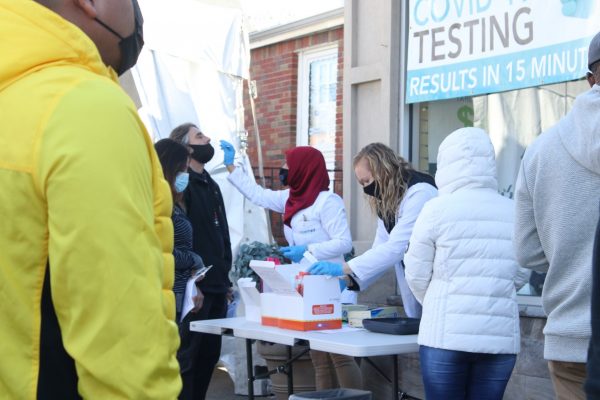Can understanding social needs help researchers predict COVID-19 outcomes?
Focused Research Program faculty members develop a predictive model for hospitalizations, disease severity, and death using dynamic vital signs and social determinants of health.
BY GINA MANTICA
Models that predict how COVID-19 affects patients are often biased due to the disproportionate effects of the disease on people of color in the United States. But researchers at Boston University (BU) and Boston Medical Center (BMC) are working to address these biases by characterizing social determinants of health that influence predictive models. The team developed a holistic model that accounts for societal biases and predicts COVID-19 hospitalization, disease severity, and deaths accurately in diverse populations.
“We wanted to see if race and socio-economic factors are important variables for predictive models of COVID-19,” says Yannis Paschalidis, Distinguished Professor of Engineering at BU and incoming Director of the Hariri Institute. The model, published recently in the Journal of the American Medical Informatics Association, incorporates both a dynamic picture of patients’ vital signs after admission and social factors like a patient’s income, neighborhood, food security, and transportation availability.
The research stems from Paschalidis’s Leveraging AI to Examine Disparities and Bias in Health Care Focused Research Program (FRP). Researchers from medicine, computer science, and engineering worked together to determine the presence of biases in health care using artificial intelligence (AI). The FRP motivated Paschalidis to consider the importance of incorporating social factors into predictive models, he says, rather than just basic data like vital signs.
BMC is a safety-net hospital, serving patients regardless of their insurance status or ability to pay, and therefore provides an opportunity to uncover new findings given its diverse patient population. In an attempt to improve clinical outcomes, BMC clinicians ask patients about their social needs to assess indicators of their social determinants of health. Paschalidis and colleagues used BMC data collected from over 7,000 patients who tested positive for COVID-19 in 2020 to create and test their predictive model. “To our knowledge, no other large data sets had previously developed and validated predictive models of hospitalization, disease severity and mortality using similar data on social determinants of health from a racially and ethnically diverse patient population,” said Dr. Sabrina A. Assoumou, co-author on the paper and Assistant Professor of Medicine at BU. Unlike other predictive models that use snapshots of vital signs, this model also incorporates changes in patients’ vital signs over the course of their stay, says Paschalidis.

The researchers’ realized that the model they created, though quite accurate, was biased. The model had a high probability of falsely predicting that a Black patient would be hospitalized. However, the researchers found a way to correct the bias in their model by equalizing the difference in false positive and false negative rates of hospitalization between Black patients and white patients.
“Without accounting for implicit and explicit biases and inequities, we run the risk of perpetuating them, rather than closing the gaps that exist,” says Dr. Rebecca G. Mishuris, Chief Medical Information Officer at BMC Health System. “AI has the potential to address inequities in healthcare but can only do so if we call those out explicitly in developing the predictive models, which will in turn be used to direct healthcare delivery.”
After the team accounted for the bias in their model, they assessed what factors are important for predicting COVID-19 outcomes. Unsurprisingly, the way that patients’ vital signs change over time is most important for predicting intensive care unit (ICU) admission, mechanical ventilation, and death. On the other hand, a patient’s reported food insecurity and lack of personal transportation seems to be among the most important predictors of whether or not a patient would be hospitalized. These two social determinants of health are often markers of economic hardship, explains Paschalidis, and could indicate larger systemic issues that contribute to health and health care inequities.
The researchers’ model can help hospital staff triage COVID-19 patients and allocate resources efficiently using readily available data, says Assoumou. It could even be used to predict hospitalizations and other health outcomes in emergency rooms more broadly if clinicians assess patients’ social needs. “There may be a lot of opportunities to intervene by addressing social needs that greatly impact long-term health, which could be a more effective and economically efficient strategy than addressing acute health issues when they arise,” says Paschalidis.
To learn more about the Hariri Institute’s transformational research, click here to sign up for our newsletter.
